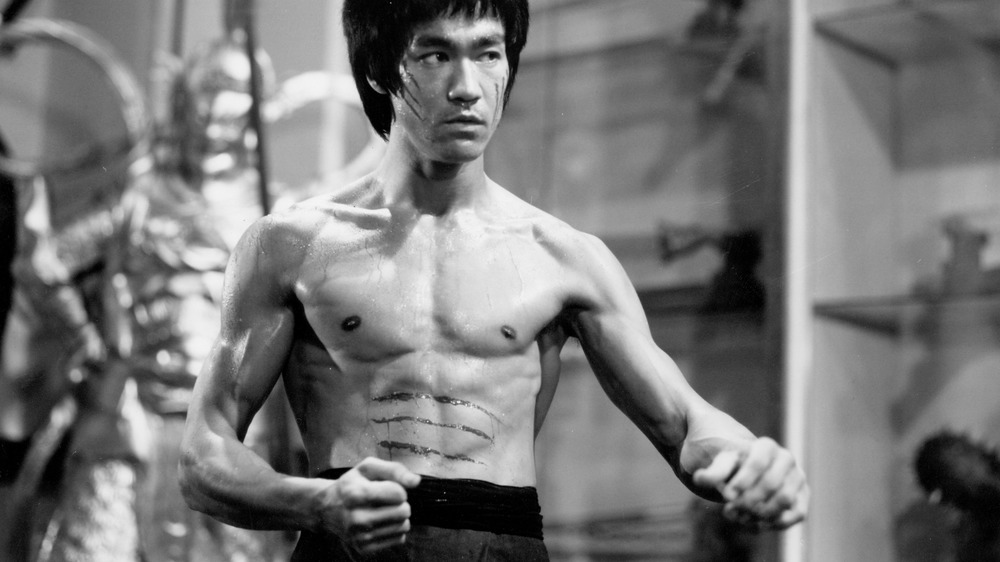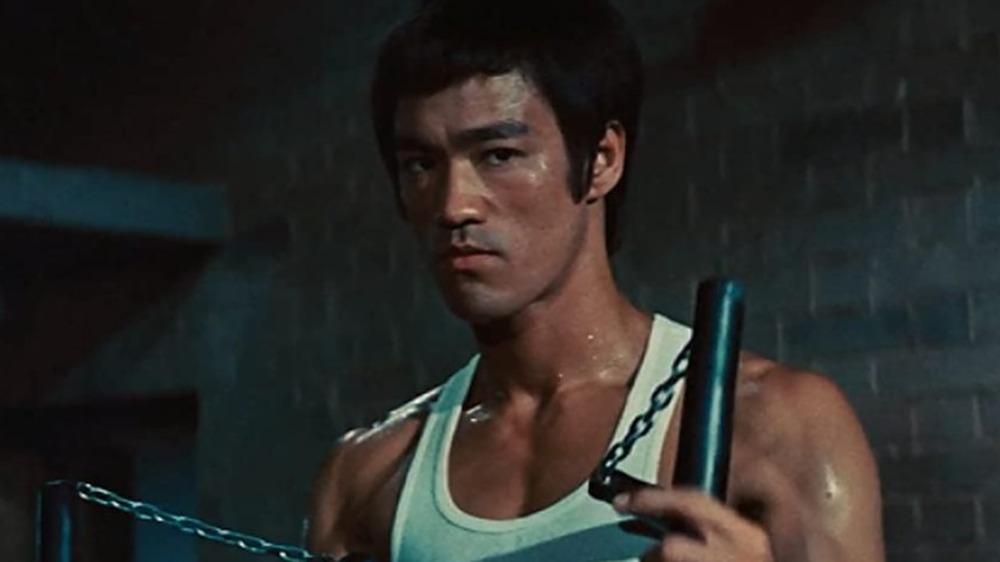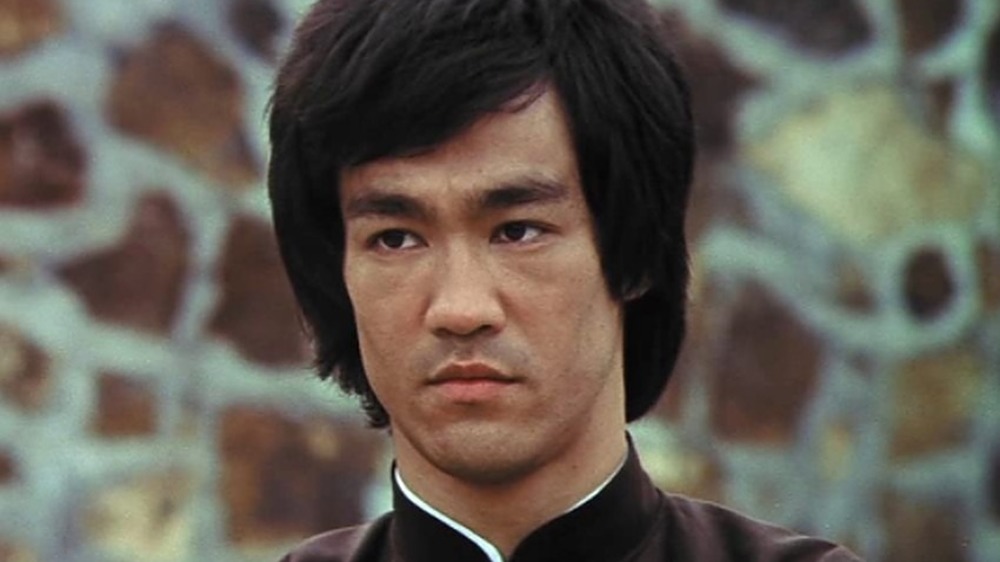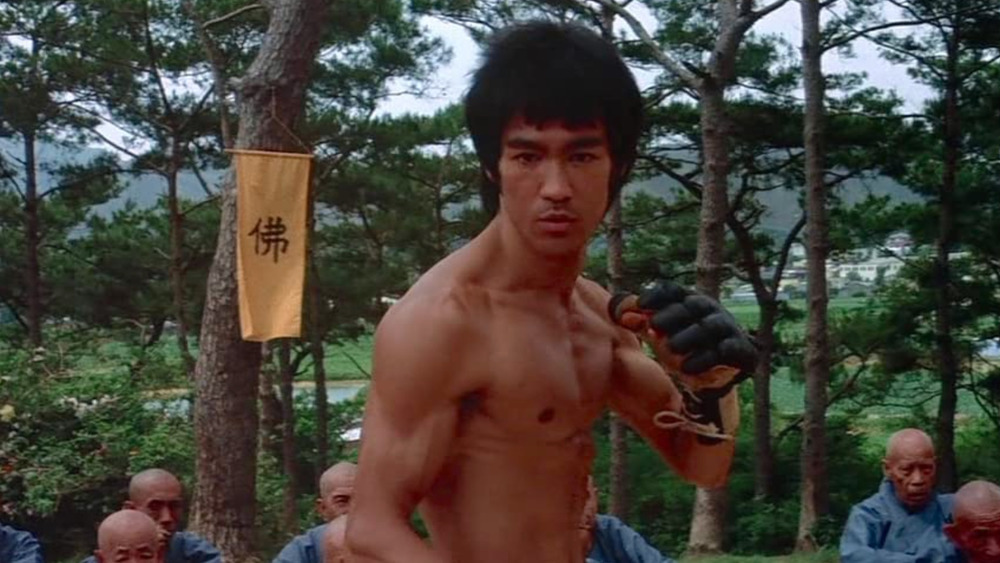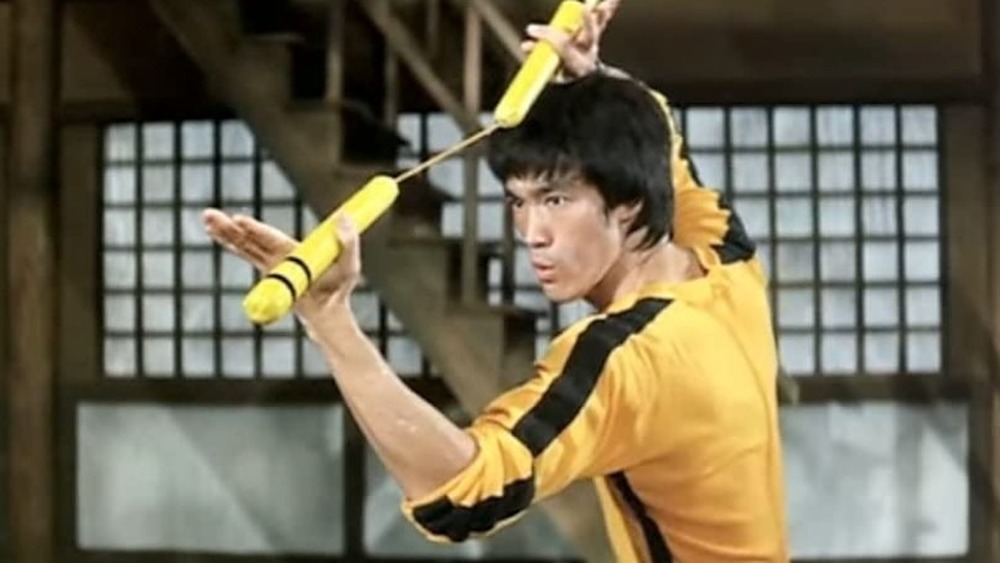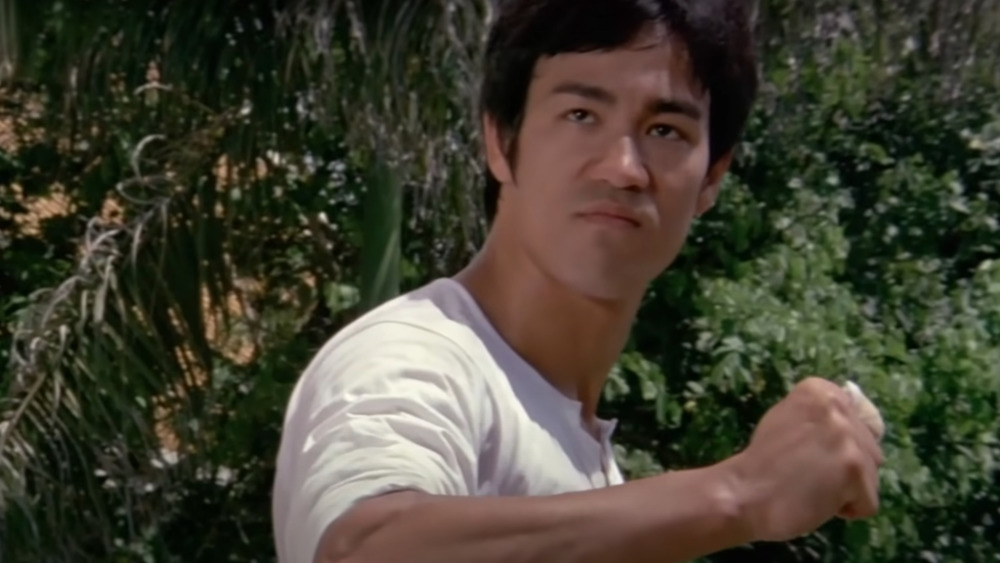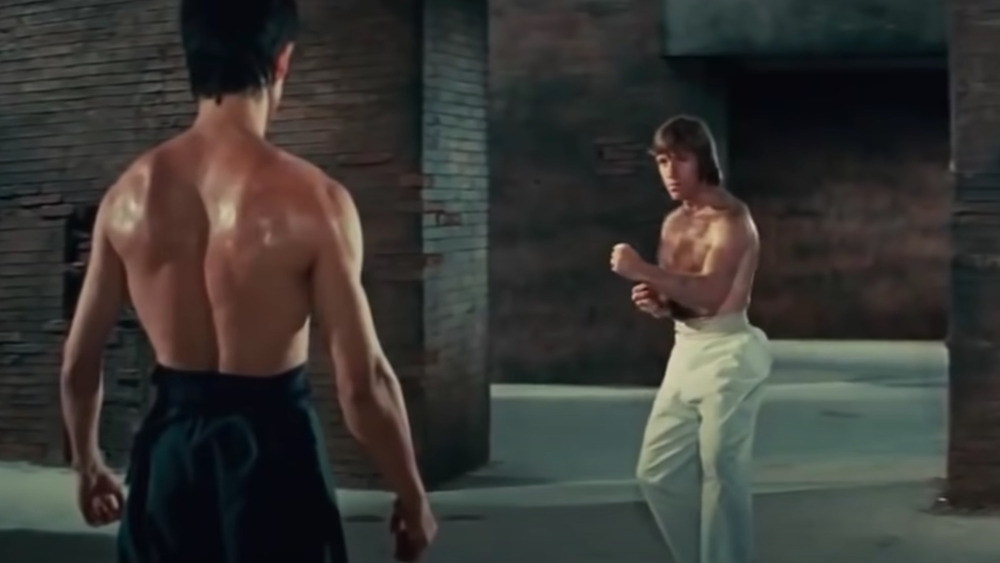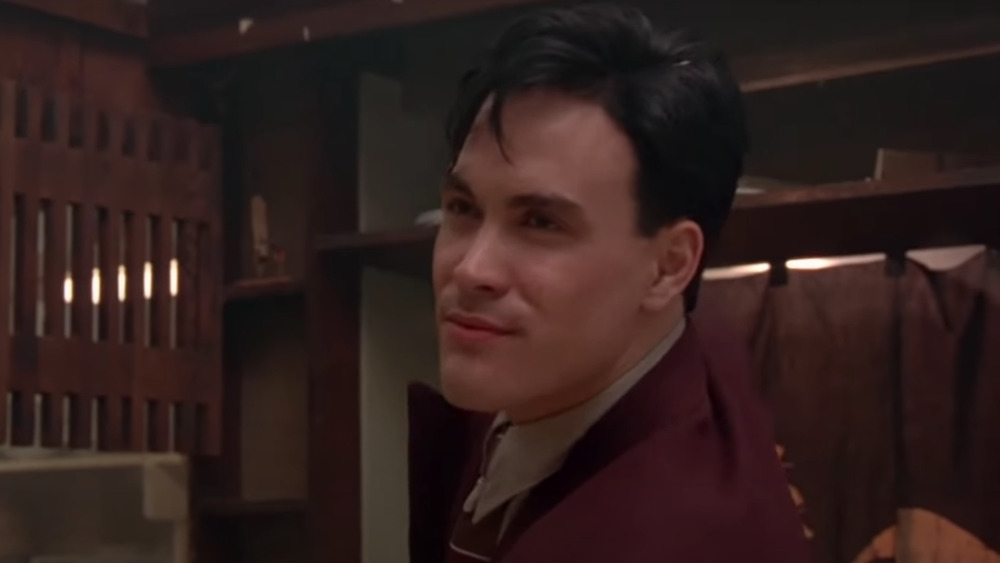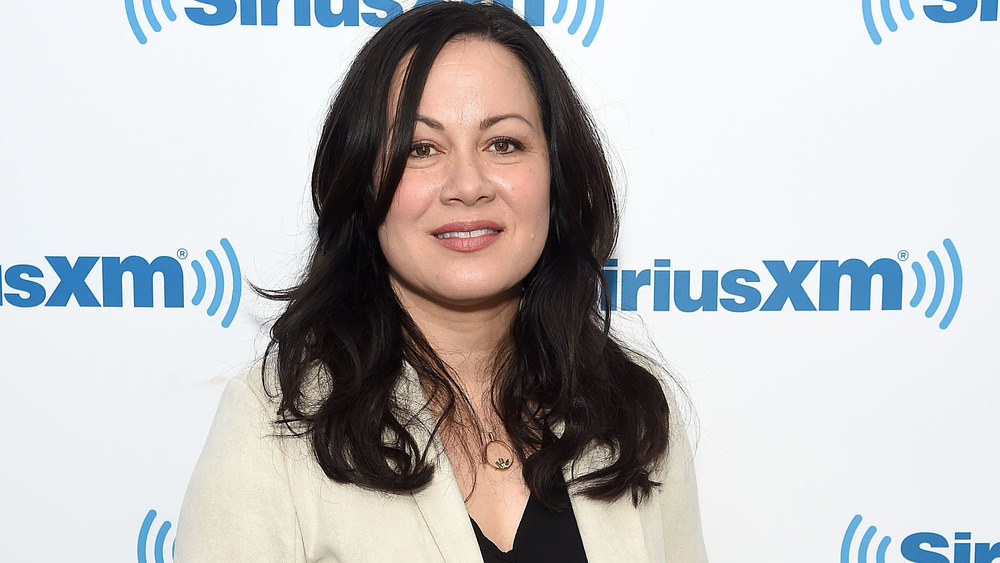The Tragic Death Of Bruce Lee
In the 21st century, fighting is in the firmament. From the big business world of MMA tournaments and enduring game system titles like Street Fighter and Mortal Kombat (or even Teenage Mutant Ninja Turtles), to the Matrix movies and Uma Thurman's jumpsuit in Kill Bill: Volume 1, so many martial arts threads tie together at the flying feet of one man: Bruce Lee, "The Dragon," who in the 1970s displayed his prodigious martial arts talents in a string of films that largely introduced the ancient combat disciplines of East Asia to Western audiences. Lee was the best ever, and a titan of 20th century popular culture.
As the Bruce Lee website notes, Lee "was born in 1940 in San Francisco, CA while his parents were on tour with the Chinese Opera ... [and] raised in Hong Kong," and his career in showbiz started when he was kid. By 1966, he was known as Kato on The Green Hornet. However, he aspired for more than sidekick work, and found it with the one-two punch of The Big Boss (1971) and Fist of Fury (1972), martial arts actioners that flaunted Lee's furiously propulsive fighting moves. Now a star throughout Asia, and with Hollywood calling, Lee made 1972's Way of the Dragon, tapping American karate champ Chuck Norris to co-star, and began work on his next film, Game of Death. He also made Enter The Dragon with Warner Brothers. In just a few short years, the martial arts icon had become a huge global star and box office gold. And then suddenly, The Dragon was dead. Here's more about the tragic death and lasting legacy of Bruce Lee.
Bruce Lee's collapse and coma
By 1973, Bruce Lee was an established star, both on screen and in martial arts circles, where his philosophies and training regimen had attracted Hollywood A-listers looking for schooling in martial arts techniques. All was right in Lee's world, but there was trouble on the horizon. According to the official website of the World Jeet Kune Do Federation, the body that carries on Lee's personal training discipline, Lee was in Hong Kong in May '73 to record vocal overdubs at Golden Harvest Studios, which was preparing the release of his new film Enter The Dragon. He collapsed, began to convulse, and was brought to Hong Kong Baptist Hospital, and he "was released after several days at the hospital."
The episode was sudden, shocking, and mysterious, as Lee seemed to be the picture of health. But he was diagnosed as having had a cerebral edema, or an increase of pressure around his brain due to the build up of excess fluid. As Newsweek wrote, "he flew to UCLA Medical Center for further testing" where "doctors diagnosed the actor as having suffered a grand mal seizure, but couldn't identify the cause."
Bruce Lee, dead in Hong Kong
The AP news report (via The New York Times) out of Hong Kong for July 21, 1973 was prim. "Bruce Lee, the Chinese actor who made a career of karate, kung-fu and other martial arts on the screen, died tonight at Queen Elizabeth Hospital after having been found unconscious in his home here. He was 32."
Lee, poised for greater stardom with the upcoming American studio release of Enter The Dragon, was dead, cut down in his prime. But the event of his death wasn't as simple as a line of news copy. As author Matthew Polly described in Bruce Lee: A Life, on that day, Lee was found unresponsive in the apartment of his mistress, Betty Ting Pei, who called his manager Raymond Chow when she couldn't wake him. "As he stood there looking down on Bruce's lifeless body and Betty's sobbing frame, the enormous danger of the situation must have dawned on Raymond," Polly wrote in an excerpt published by The Ringer. "The most famous man in Hong Kong was dead in his mistress's bed, and the two of them were the only witnesses."
When Lee had a headache that day, Polly wrote that Ting Pei "offered him one of her Equagesic pills." And according to the official Bruce Lee website, a coroner's inquest concluded "that Bruce had a hypersensitive reaction to an ingredient in the pain medication that caused a swelling of the fluid on the brain, resulting in a coma and death."
Bruce Lee died before the release of his biggest hit
"When the seminal martial arts film Enter the Dragon premiered in August 1973," wrote WAMC Northeast Public Radio in a 2018 celebration of the film's legacy, "it was exactly what Bruce Lee had been waiting for: A starring role in a Hollywood production." He died instead, just a month out from what would have been the biggest moment of his skyrocketing career, and the star's positive legacy as a promoter and benefactor of martial arts is forever linked to the circumstances of his untimely death.
Lee's death also robbed him of the ability to control that legacy. As Anna Trowby wrote for Varsity, Lee's death "left a hole in the martial arts genre that film studios were willing to exploit for commercial gain." While his success battled back at Hollywood's prejudice toward and stereotyping of Asian actors, Trowby writes that after Lee's death, "studios hired Asian actors exclusively for gimmicky martial arts roles, and this became another stereotype for them to commit to."
Still, in the volatility of Lee's legacy also lies the hallmarks of his magnetism: physical and mental power. "He was an unabashed sex symbol," wrote CNN's John Blake. "Women marveled over his lithe physique; one person said touching his hardened muscles was like touching 'warm marble.'" But there was also a furious mind behind those muscles. Blake wrote that Lee could "move from perfect stillness and 'explode like a firecracker'" because he channeled "what ancient Chinese philosophers called 'chi.'"
The fate of Bruce Lee's Game of Death
As Grunge wrote in a piece exploring Bruce Lee's death, Game of Death could have been his finest achievement. "The movie would've followed the head-kicking hero as he battled his way up a pagoda, searching for a valuable treasure and fighting a new boss at every level," lamented the outlet. With every boss bringing the heat as a "master of a particular martial art style," as Grunge noted, audiences would've gotten to see Lee "display different tenets of Jeet Kune Do (his philosophy of flexibility and adaptability) to defeat his foes."
The Game of Death scenes that Lee did film pack a major, yellow jumpsuit-clad punch. Some outlets, such as Vice, report that there were "roughly 40 minutes of footage" in the can when Lee died; others, including Vulture have it at 100 minutes. Either way, it wasn't a lot, but said footage includes some of his most electrifying fight sequences, like the infamous showdown with 7' 2" NBA legend Kareem Abdul-Jabbar (Lee was 5' 8").
When Lee died, the project was dead, too. Or was it? As Screen Rant related, Golden Harvest, who owned the footage, took steps "to release the movie anyway." This involved bringing in body doubles and "relying on lighting (or lack thereof), sunglasses, disguises, shots of the actor from the back, and more," wrote Screen Rant. The outlet also pointed out that Golden Harvest "went as far as to superimpose an image of Lee's face over the stand-in." Obviously this made for an awkward, even schlocky film.
Questions surrounding the cause of Bruce Lee's death
As soon as the news was made public of Bruce Lee's untimely death, the rumor mill came to life. And while a cerebral edema remains the official cause, alternate theories abound, even decades later. In Bruce Lee: A Life, a biography of the martial arts star, author Matthew Polly posits that it wasn't the edema that felled Lee, but heatstroke. In an Entertainment Weekly piece entitled "5 myths about Bruce Lee, debunked by the author of his new biography," Polly writes that in the months before his death, "Bruce Lee had the sweat glands in his armpits surgically removed, because he didn't like how his dank pits looked on screen. The day he died, July 20, 1973, was the hottest month in tropical Hong Kong...Bruce was vigorously performing scene after Kung Fu scene from his next movie in Betty's small apartment when he began to feel dizzy. He complained of a headache, went to lie down, and never got up again."
Polly's assertions about that day in Lee's mistress's flat would seem plausible, at least in theory. But the same could be said for the theories of Chicago pathologist Dr. James Filkins. As The Guardian explains, Filkins thinks "Lee died of a condition called sudden unexpected death in epilepsy (SUDEP), which was only recognised in 1995." Nearly 50 years after Bruce Lee's demise, its cause is still up for debate.
Chuck Norris, Kanye West, and conspiracy theories
A doctor says it was epilepsy. A biographer says it was heatstroke. But the theories surrounding the death of Bruce Lee don't end there. Chuck Norris, who knew Bruce Lee and worked with him in the 1972 film Way of the Dragon, put forth his theory of what happened during an appearance at the 1975 San Diego Comic-Con Convention. Norris explained that Lee had suffered from chronic back pain stemming from a weight-lifting mishap. And that day in Betty Ting Pei's Hong Kong apartment, Norris said, Lee "got a severe headache" so he took "some antibiotics for the headache." However, according to Norris, "the medication he'd taken for his back, and the medication he'd taken for his headache, they reacted to each other, and made his brain swell up, and created an aneurysm, or ruptured blood cells in his brain. That's actually what happened."
Furthermore, there are lots of "conspiracy theories about his death," as a 2019 CNN article put it, including that "Lee was felled by a family curse or taken out by the Chinese mafia." Or what about Kanye West? "This is a negative thought I'm putting into the universe — but I thought about Bruce and Brandon Lee," the mercurial rapper told the Joe Rogan Experience podcast in October 2020, according to Variety. "Rogan asked West to clarify why he brought up the two deceased film stars," wrote Daily Dot of the episode. "Kanye responded by asserting that the iconic father and son had both been 'murdered.'"
Brandon Lee's sad struggle with his dad's legacy
In March 1993, Bruce Lee's son Brandon Lee died after an accident on the set of his film The Crow. Given his father's untimely demise, and the rumors that still swirled so many decades later, the younger Lee's death was a bitter, twisted addition to the narrative. "Lee's 28 years on earth were intense, much of the time spent wrestling with the legacy left to him by his father, formidable martial-arts superstar Bruce Lee," wrote Entertainment Weekly in 1993. Ever since 1973, EW continued, "the tabloids have linked Lee's death to drugs and voodoo and the Chinese mob, never letting the young Lee forget his grief." It's tough enough to make it in Hollywood. To be saddled with a morbid legacy, and dying himself in an attempt to live up to it, feels too close to the fulfillment of all those dark tabloid prophecies.
In a 1993 New York Times piece entitled "Fate's Children: Bruce and Brandon," Betsy Sharkey wrote that "someone close to the family observed, both father and son died 'as they were just becoming.'"
"And when Brandon died," continued Sharkey, "he was still striving to free himself from the action genre that had so defined his father. Both father and son struggled to realize the American dream, only to have death leave them on the verge of success." The parallels between father and son, their lives and careers abruptly cut short, are nothing less than eerie.
Bruce Lee's daughter keeps his true legacy alive
The years since Bruce Lee's death have been filled with onscreen exploitation of his legacy and wild theories about his death, so it's been the mission of his daughter to uphold the true measure of her father. "Most people know the name Bruce Lee, but they only know him as that cool Kung Fu guy in those old movies," daughter Shannon Lee told NBC News. "They do not know much about his philosophy and how he lived it very actively in his life." Shannon co-founded The Bruce Lee Foundation, which according to NBC News operates the "a Bruce Lee Action Museum, a scholarship program, and the 'Little Dragons' martial arts education program."
"My father had a philanthropist's mind and a philanthropist's spirit because he wanted to encourage people to their best selves through his philosophy on self-actualization, being like water, and living in the flow of life," Shannon told NBC News.
In a further celebration of her father's work and legacy, Shannon is also an executive producer of Cinemax's Warrior. Declared one of "the best shows of the year's first half" in 2019 by Rolling Stone, the series is based on her father's own treatment and writing. Speaking with Collider about how it all fits into Bruce Lee's true legacy, Shannon said, "His life and words had been and are so meaningful to me that I wanted to amplify that, out in the world."

